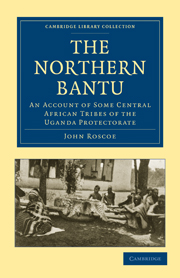Book contents
- Frontmatter
- PREFACE
- Contents
- LIST OF ILLUSTRATIONS
- Uganda and British East Africa
- PART I THE BANYORO A PASTORAL PEOPLE
- CHAP. I THE COUNTRY, THE PEOPLE, THE KING
- CHAP. II GOVERNMENT
- CHAP. III CLANS, TOTEMS AND TERMS OF RELATIONSHIP
- CHAP. IV MARRIAGE AND BIRTH
- CHAP. V SICKNESS AND DEATH
- CHAP. VI INDUSTRIES
- CHAP. VII WARFARE
- CHAP. VIII HUNTING, DRUMS AND THEIR USE
- CHAP. IX RELIGIOUS BELIEFS
- PART II THE BANYANKOLE A PASTORAL TRIBE OF ANKOLE
- PART III THE BAKENE, LAKE DWELLERS
- PART IV THE BAGESU A CANNIBAL TRIBE
- PART V THE BASOGA
- PART VI NILOTIC TRIBES. THE BATESO AND THE KAVIRONDO
- INDEX
- PUBLICATIONS OF THE CAMBRIDGE UNIVERSITY PRESS RELATING TO AFRICA
- Plate section
- Frontmatter
- PREFACE
- Contents
- LIST OF ILLUSTRATIONS
- Uganda and British East Africa
- PART I THE BANYORO A PASTORAL PEOPLE
- CHAP. I THE COUNTRY, THE PEOPLE, THE KING
- CHAP. II GOVERNMENT
- CHAP. III CLANS, TOTEMS AND TERMS OF RELATIONSHIP
- CHAP. IV MARRIAGE AND BIRTH
- CHAP. V SICKNESS AND DEATH
- CHAP. VI INDUSTRIES
- CHAP. VII WARFARE
- CHAP. VIII HUNTING, DRUMS AND THEIR USE
- CHAP. IX RELIGIOUS BELIEFS
- PART II THE BANYANKOLE A PASTORAL TRIBE OF ANKOLE
- PART III THE BAKENE, LAKE DWELLERS
- PART IV THE BAGESU A CANNIBAL TRIBE
- PART V THE BASOGA
- PART VI NILOTIC TRIBES. THE BATESO AND THE KAVIRONDO
- INDEX
- PUBLICATIONS OF THE CAMBRIDGE UNIVERSITY PRESS RELATING TO AFRICA
- Plate section
Summary
The king the sole possessor of land. The land belonged solely to the king who could dispose of it as he willed. Peasants, however, were free to settle anywhere in the country without asking for permission from the chief to whom the oversight of the district belonged, for even the king did not regard his land with any such pride or as of such value as the king of Uganda regarded his. The king and the upper classes of the people valued land for its pastoral rather than for its agricultural qualities. Those districts which were good as pasturelands were esteemed as of greater value than districts only suited for cultivation.
District chiefs. Chiefs were appointed to govern large tracts of country. They were given, when elected, the title Musaza, pl. Bamasaza. These district-chiefs had sub-chiefs under them, each of whom was known by the title Ndibalaba, and these again had minor chiefs under them. Princes were sent from the capital, when they were eight or nine years old, into the country and there placed under responsible herdsmen who trained them in the arts of cattle-breeding, milking, herding and treating cows when sick. These princes were expected to learn all about cattle, and to be in no wise inferior to the most skilled herdsman.
- Type
- Chapter
- Information
- The Northern BantuAn Account of Some Central African Tribes of the Uganda Protectorate, pp. 18 - 26Publisher: Cambridge University PressPrint publication year: 2010First published in: 1915



